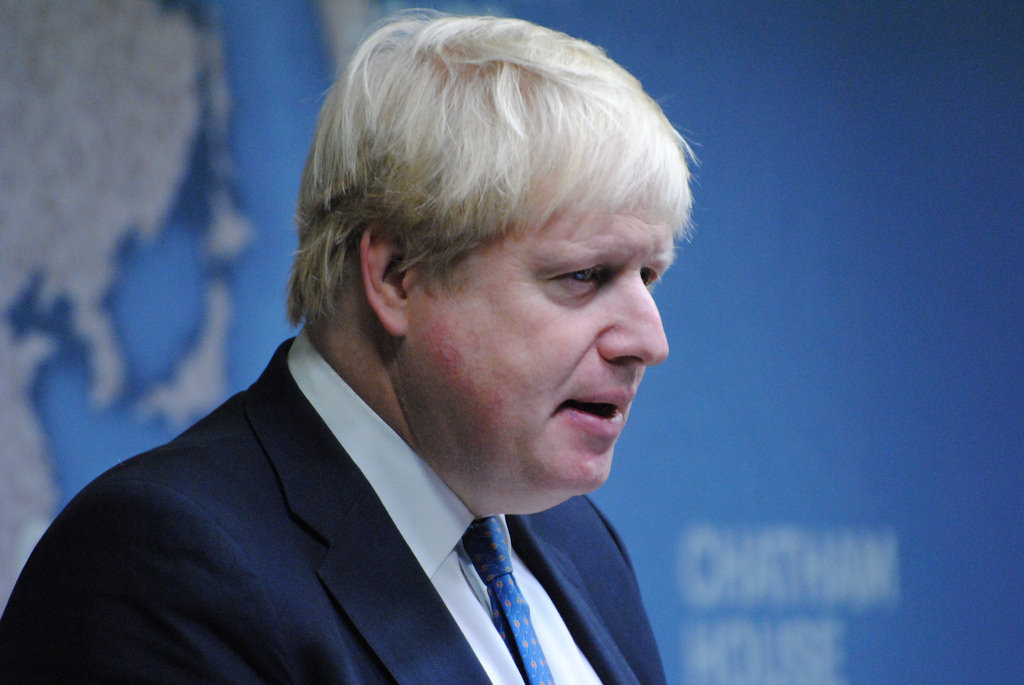How the UK Government Resignations Signal the Demise of a ‘Hard’ Brexit
Fresh from the NATO summit, President Donald Trump arrived in the United Kingdom on Thursday to engage with a British government that is in disarray.

Published by The Lawfare Institute
in Cooperation With

Fresh from the NATO summit, President Donald Trump arrived in the United Kingdom on Thursday to engage with a British government that is in disarray.
On Sunday evening, David Davis, the United Kingdom’s secretary of state for the exiting of the European Union (a.k.a. the “Brexit” secretary), resigned from office and was replaced by Dominic Raab, the former housing minister. Davis was quickly followed out the door by one of his deputy ministers, Steve Baker, who cited the same reasons Davis had for leaving. Foreign Secretary Boris Johnson resigned the next day, calling the government’s Brexit negotiation stance tantamount to sending the U.K. toward “the status of a colony.” The resulting Cabinet reshuffle has put former health secretary Jeremy Hunt in as foreign secretary. Matt Hancock, former secretary of state for digital, culture, media and sport, becomes health secretary. Attorney General Jeremy Wright becomes the digital secretary, and Geoffrey Cox is to be attorney general. Oh, and two of the Conservative Party’s vice-chairs, Maria Caulfield and Ben Bradley, also resigned their posts. Got all that?
Each official attributed his or her resignation to the “Chequers memo,” a draft of Brexit negotiating terms reached during a Cabinet meeting last week at Chequers, the prime minister’s official country house. Just this morning the government published a 98 page white paper outlining the details of that negotiating stance. But earlier this week, the U.K. got a taste of the controversial memo through a three-page summary that showed plans for a significantly “softer” Brexit than Theresa May’s government had previously discussed.
Controversial negotiating positions in this memo include creating a combined customs territory between the European Union and the U.K. The U.K. would be obligated to police the traffic of goods to the EU and to apply EU tariffs when goods are destined for EU shipment. It would also abide by a common rulebook for all goods crossing the border in order to promote harmonization. The document also proposed splitting jurisdiction for some matters: a “joint institutional framework” would interpret agreements between the U.K. and the EU, but British and European courts would handle cases and interpretation of their laws in their respective jurisdictions. Having previously committed to a full exit from the single market and a separation from EU jurisdiction (a “hard” Brexit, for the purposes of our discussion), the terms that emerged from Chequers were an affront to hard-line Brexiteers in May’s government. To Davis and Johnson, these compromises were a betrayal of the spirit of Brexit.
If your head is spinning, that means you’re paying attention.
The implications of this shake-up are bigger than Hunt’s foreign-affairs prowess or Raab’s negotiating experience. They are bigger than the question of whether May will contest a no-confidence vote from her party (should one be held, sooner or later). In fact, they are bigger than the (still important) question of whether the government’s Chequers proposal sufficiently meets hard-liner Brexit goals. These resignations, happening more than one year into Brexit negotiations, suggest something more fundamental: that a hard Brexit cannot work.
To quickly review how things reached this point (for a more detailed recap, check out my earlier coverage in Lawfare’s Brexecution series): The fateful Brexit referendum happened on June 23, 2016. The U.K. formally notified the European Union of its exit on March 29, 2017. Under the terms of Article 50 of the Treaty on the European Union, this notification automatically starts the clock on a two-year timeline to official withdrawal. That means the U.K. leaves the EU on March 29, 2019. The two sides have agreed on a draft withdrawal plan that includes an “implementation period”—from exit on March 29, 2019, to Dec. 30, 2020—during which much of the status quo will be maintained, though the U.K. will no longer be involved in EU decision-making procedures.
Despite the transition period, both sides have been gunning to finalize a deal—including both the withdrawal agreement and the terms of a future relationship—before October, when the European Council is supposed to review the draft deal and push toward ratification. The next step in scheduled negotiations is to begin next week. Part and parcel of this push was the recent Chequers proposal. The official Conservative Party stance—that is, until the Chequers memo—was to negotiate a “hard Brexit”: including leaving the EU customs union, leaving the single market and emancipating the U.K. from the jurisdiction of EU law. The government white paper explaining the details of the much softer proposal will likely surface more discontent over the day; even before the white paper was released to the public there were reports of profound cabinet minister dissatisfaction. Considering that the Chequers meeting and the three-page teaser alone led to two Cabinet resignations, what follows is bound to be dramatic for May and her government.
Boris Johnson’s resignation letter was perhaps the most expressive of the bunch:
Brexit should be about opportunity and hope. It should be a chance to do things differently, to be more nimble and dynamic, and to maximize the particular advantages of the UK as an open, outward-looking global economy.
That dream is dying, suffocated by needless self-doubt.
May’s response was straightforward: “I am sorry—and a little surprised—to receive [your resignation] after the productive discussions we had at Chequers on Friday, and the comprehensive and detailed proposal which we agreed as a Cabinet.”
The rash of resignations and internal dissent suggests that May’s government is in danger, but she has held off the wolves so far. On the evening of June 9, May contended with threats of a no-confidence vote from her own party, but calmer voices prevailed. She may still face such a vote—perhaps even this year—but the prospect of another leadership upheaval over Brexit, especially at the late stages of negotiations, is scary for both the Tories and their EU counterparts; the EU doesn’t need to add an even-more-delayed Brexit to its list of geopolitical problems.
So the U.K. finds itself halfway toward the deadline of Brexit negotiations, with a draft withdrawal plan but no final agreements signed, while simultaneously sorting through another domestic government upheaval. Despite this, the EU chief negotiator, Michel Barnier, has said that 80 percent of the Brexit deal is done. This contrasts starkly with previous EU statements and with the political upheaval in the U.K. But the EU has reason to encourage Britain’s new Brexit minister, Raab, to come to the table next week with the diluted terms; Barnier himself has said, “It will be clear, crystal clear at the end of this negotiation that the best situation, the best relationship with the EU, will be to remain a member.”
How, precisely, that would work is unclear. The EU’s end game is to restore the status quo and the U.K.’s is to break away from it. These goals are incompatible, and the British government is struggling with its internal incoherence concerning them. Over the course of a year, the Tories have been unable to cobble together a coherent solution to some threshold questions: What will happen to the border between Northern Ireland and Ireland? What does a mutually agreeable future trade deal look like? Some politicians have suggested domestic reform in the spirit of Singapore—meaning low taxes, low spending and reduced regulatory barriers all to make the British economy more attractive to investment and more resilient. But an immense overhaul of government to accomplish what many view as an unnecessary divorce from the EU seems like the path of highest resistance. And even then, the initial economic costs will be large.
Compounding this dog’s breakfast, the NATO summit in Brussels has just concluded. Independent of whatever baggage Trump acquires at the summit, his visit is already controversial. Trump is mostly avoiding London because of long-planned protests and instead will meet with Queen Elizabeth at Windsor Castle and with Prime Minister May at Chequers. He has joked that his sitdown with Russian President Vladimir Putin--happening the following Monday--will be the “easiest of all” his upcoming meetings, including his visit with May. There is a non-zero chance that Trump will further complicate the U.K. domestic picture. He has been notoriously supportive of Brexit, lauding it in 2016 as a “great victory,” and he counts Johnson, the just-departed foreign minister, as a friend. His interactions with May and any public statements he makes could turn public or party opinion.
It’s important to note what this week’s events imply: Hard Brexit as envisioned at the time of the referendum (setting aside the fuzziness with which that concept was conveyed to the public) will not happen. Brexit cannot be a clean break. Avoiding a patrolled border between Northern Ireland and the Republic of Ireland will require a customs and trade compromise. And despite Johnson’s suggestion that a soft Brexit portends colonization, the United Kingdom has legitimate economic and social interests in being a part of the single market; frictionless commerce and movement with the EU is beneficial to the U.K. The irony is that, in actualizing the will of the people as manifested by a vote ostensibly distilling it, the government has run into a wall: What the people “wanted” may not be what’s best for them.
May is caught between a rock and a hard place: At this stage, she has to get a Brexit deal; no deal at all is the worst possible outcome considering the volume of trade and movement. But while extending the negotiating period to reach the best deal may be helpful in the short term, further protracted uncertainty will discourage investment in London and push big business to the continent. So when members of May’s government lament the softening of negotiation terms but do not present reasonable alternatives, what is she to do but replace them with more pragmatic conservatives? And when her party questions her ability to lead in light of Chequers and the resignations, they are simultaneously considering the difficulty of rebuilding a government that can take on the enormous task of Brexit, within current deadlines, while also maintaining stability amid other pressing geopolitical matters.
There is a small chance that proponents of a hard Brexit win this fight. If May is ousted, she might be replaced by a more dogmatic Tory Brexiteer. If that happens, negotiations will almost certainly be extended or, worse, the United Kingdom will be cast out of the EU with no deal at all, facing whatever barriers to trade and association that the EU can muster. But it’s more likely that the recent chaos is hard Brexit’s swan song; an indication that principle is finally giving way to pragmatism.





